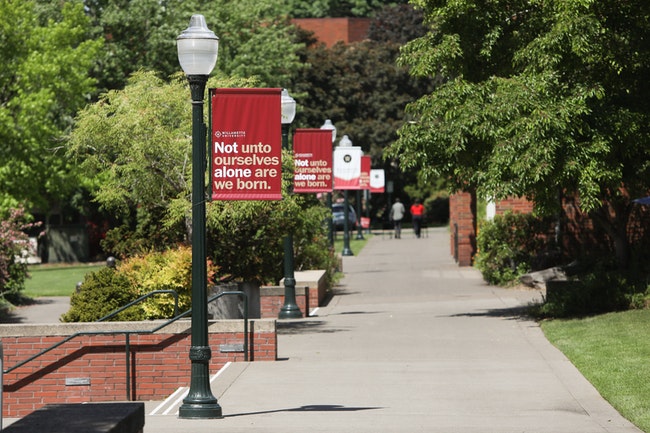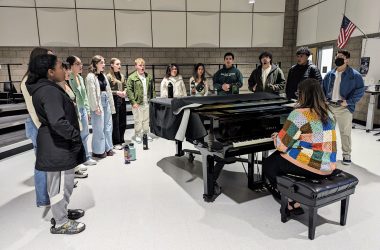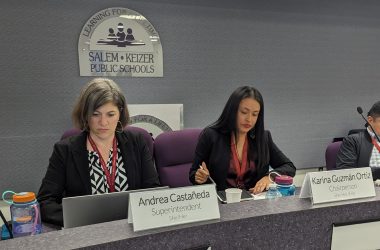Jameson Watts thinks tomorrow’s programmers and data analysts need to know more than how to code.
As chair of Willamette University’s computing and data science programs, he’s seen companies embrace artificial intelligence, analytics and other new frontiers of technology while concerns of human impact, ethics and privacy take a backseat.
“Many companies have kind of ignored how the data is acquired, how the data is managed and how things like privacy (are) preserved,” he said. “An explicit focus on those issues is something that many students are just not trained to think about.”
Those issues will be front and center at Willamette’s newest college — the School of Computing and Information Sciences, which the university announced last week.
The college will house existing graduate programs in data science which until now have been part of the Atkinson Graduate School of Management, as well as undergraduate courses focused on computer science and data analysis.
Watts will serve as dean of the new school, which will expand to offer a master’s degree in computer science and other undergraduate and graduate programs in both Salem and Portland.
Planning for the school began about four years ago, Watts said, when administrators began considering new programs the university should offer.
Watts and fellow professors at the Atkinson school were teaching data analytics to MBA students, while other faculty were teaching similar programs to undergraduates. Interest was growing, so the provost asked him to unify Willamette’s data programs.
“It has grown faster and bigger than anyone expected,” Watts said.
He’s now teaching his third cohort of master’s students in data science: 27 students who will graduate in August.
Willamette will differentiate itself from other computer science and data programs through its offerings in humanities, arts, sciences and other fields.
The new school “equips our students – from all backgrounds and career pathways – with the technological skills they’ll need to fulfill their mission of building a better world,” university President Stephen Thorsett said in a statement. “We’re not just teaching them how to write code and read data sets; we’re teaching them how to apply those skills in an ethical, creative and human-centered way.”
At larger state schools or technical colleges, students seeking to major in computer science or analytics rarely have room in their schedules to explore other disciplines.
“Good luck taking any other classes but computer science classes,” Watts said.
But he said that can lead to problems when students are trained to solve technical problems or develop software without considering the human impacts.
Those issues include algorithmic bias, when a technology is built in a way that produces unequal outcomes along racial, gender or other lines, often because it’s trained on data containing the same biases. Amazon in 2018 scrapped an artificial intelligence tool intended to screen resumes after finding it was unfairly screening out female applicants because, in a reflection of the tech industry, the real resumes it was trained on mostly belonged to men.
“We read every day about the increase in suicide rates in the teenage population and the unrealistic expectations that social media gives young people,” Watts said. “These aren’t necessarily privacy or ethics issues but rather the way humans interact with technology leading to problems in society.”
In Willamette’s programs, students will be required to take a course on data ethics. The new school will partner with the Pacific Northwest College of Art, which merged with Willamette in 2021, to offer classes on critical perspectives on computing.
The addition comes as Willamette has seen declining enrollment over the past decade, though enrollment grew this fall after a significant dip during the pandemic.
The university had 1,915 students enrolled this fall, 1,367 of whom were undergraduates.
Watts said the addition of a school focused on computer science and data reflects a larger effort at Willamette to attract more students in part by combining traditional liberal arts fields like history, philosophy and biology with more career-focused offerings.
Watts said a greater focus on careers has gotten some pushback, as liberal arts colleges have generally focused on the pursuit of general knowledge and education for its own sake. But he said faculty in other disciplines also recognize the value in students understanding data analysis tools for tasks like mass uploading and analyzing text in historical documents.
“We’re spreading the love as wide as we can because all of the disciplines at the university benefit when students have this kind of knowledge,” he said.
Contact reporter Rachel Alexander: [email protected] or 503-575-1241.
JUST THE FACTS, FOR SALEM – We report on your community with care and depth, fairness and accuracy. Get local news that matters to you. Subscribe to Salem Reporter. Click I want to subscribe!

Rachel Alexander is Salem Reporter’s managing editor. She joined Salem Reporter when it was founded in 2018 and covers city news, education, nonprofits and a little bit of everything else. She’s been a journalist in Oregon and Washington for a decade. Outside of work, she’s a skater and board member with Salem’s Cherry City Roller Derby and can often be found with her nose buried in a book.









